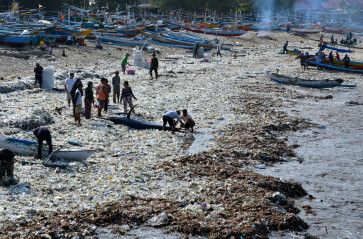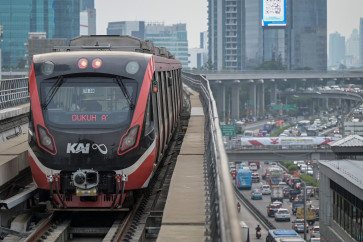View Point: When Jokowi’s ‘shut up’ order works
Immediately after the international arbitration court issued its verdict on the South China Sea (SCS), the Foreign Ministry issued a four-paragraph statement
Change text size
Gift Premium Articles
to Anyone

Immediately after the international arbitration court issued its verdict on the South China Sea (SCS), the Foreign Ministry issued a four-paragraph statement. The extra-cautiously crafted reaction was distributed to journalists and uploaded on the ministry’s website.
Foreign Minister Retno LP Marsudi did not hold a press conference about the ruling from The Hague. There was general, uncharacteristic silence. None of the Cabinet ministers who often talk vigirously — but often with damaging effects — about the South China Sea dispute, such as Coordinating Maritime Affairs Minister Rizal Ramli, or Defense Minister Ryamizard Ryacudu, made any attempt to attract media attention.
“Indonesia once again calls on all parties to exercise self-restraint and to refrain from any action that could escalate tensions, as well as to protect the Southeast Asian region particularly from any military activity that could pose a threat to peace and stability and respect international law […],” said the Foreign Ministry statement.
The Cabinet’s hush-hush was because earlier the basic message from their boss President Joko “Jokowi” Widodo had been “Shut up.” Using, of course, more polite language, he told his ministers days before the verdict announcement that only the President or Minister Retno had the authority to respond to the verdict. The government was very confident that China would be the loser in the case.
I do agree with the President’s single-door policy on the sensitive issue — even the Philippines’ Foreign Minister Perfecto Rivas Yasay held only a very short media briefing. Manila overwhelmingly won the legal battle. But our President did not want to unnecessarily provoke China’s anger, because Indonesia clearly could benefit majorly from the ruling.
However, I disagree with the President’s decision to discourage his chief diplomat Retno to directly meet with the media. The minister herself should appear in public, instead of hiding behind the ministry’s website. Why was the government so scared to talk to the media? The public might conclude that Indonesia was afraid of provoking China.
It seems the President has little confidence in Retno. Jokowi has little experience, and worse, also shows little interest in foreign policy, apparently as a former pragmatic businessman. He also lacks a special advisor on international affairs, especially since the appointment of senior scholar Rizal Sukma as Indonesia’s ambasador to the UK.
Indonesia is by all measures the largest member of ASEAN. Its leadership is extremely necessary in facing China, especially in the South China Sea dispute. China has effectively divided the 10-member regional grouping in avoiding ASEAN as a single entity in dealing with China. Our President for sure realizes the obligation of the regional leadership; however, he also realizes that Indonesia should avoid confrontation with China, one of its most important trading partners.
Indonesia is not a claimant to the resources-rich South China Sea, but about 80,000 square meters of Indonesia’s exclusive economic zone (EEZ) in the Natuna Islands is included in China’s nine-dash line .
Jokowi’s ministers have often competed to promote themselves as media darlings by volunteering to speak up on subjects that have nothing to do with their assignment. On the South China Sea, they have displayed a strong sense of nationalism as if Indonesia were ready to go to war with the giant up north in defending Indonesia’s territorial integrity.
The result? They often make shallow, sometimes even silly remarks on the sensitive issue. The military announced a plan to strengthen its presence in Natuna. Maritime Affairs and Fisheries Minister Susi Pudjiastuti, along with the Navy, has taken quite agressive measures against poachers around Natuna waters, to Chinese protests. The government has every right to defend Natuna. But who is in charge to deal with the public?
The government has also seemed chaotic in handling the kidnappings of Indonesian sailors in the southern Philippines and in Sabah, Malaysia. The defense minister boasted he had won a guarantee from the Philippines that Indonesia would get full access and cooperation if Jakarta deployed troops to liberate the hostages. Indonesian Military (TNI) chief Gen. Gatot Nurmyanto and Retno however indicated that the defense minister was wrong in his conclusion.
The Foreign Ministry should be in the frontline of international diplomacy, including on the South China Sea. However, many of its officials still have the old mindset that the ministry should be the single authority in formulating foreign policy. The TNI and the Defense Ministry are among state institutions that often complain of being left out on security- and defense-related policies or activities.
The Foreign Ministry has no choice but to accomodate — and not half-heartedly — the aspirations or strategic interests of other state institutions, and even those of the public. Although foreign policy is not a top priority for the President, the country cannot remain inward-looking for too long.
Anyway, the President is absolutely right in disciplining his ministers. This is not just about the South China Sea. There have been too many damaging examples of ministers attacking each other in public. So, shut up!
The writer is senior managing editor of The Jakarta Post.









